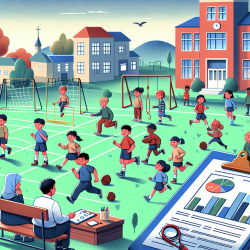Introduction
In the quest to enhance children's health-related quality of life (HRQoL), schools have increasingly turned to physical activity interventions. The Active Smarter Kids (ASK) study, a cluster-randomized controlled trial conducted in Norway, sought to evaluate the impact of a school-based physical activity program on HRQoL among 10-year-old children. Despite the well-intentioned efforts, the study found no significant improvements in HRQoL, raising important questions for educators and practitioners.
Study Overview
The ASK study involved 1,229 children from 57 elementary schools, divided into intervention and control groups. The intervention schools (I-schools) received an additional 165 minutes of teacher-led physical activity weekly, on top of the standard 135 minutes. The control schools (C-schools) continued with the standard curriculum-prescribed physical activity.
HRQoL was assessed using the Kidscreen-27 questionnaire, which measures five domains: physical well-being, psychological well-being, autonomy & parents, social support & peers, and school environment. Surprisingly, the intervention showed no significant effect on any of these domains.
Key Findings
- No significant difference in physical activity levels between intervention and control groups.
- No improvement in HRQoL across any of the Kidscreen-27 domains.
- Potential reporting bias and limitations in accelerometer sensitivity were noted.
Implications for Practitioners
For practitioners, these findings suggest that merely increasing physical activity time may not suffice to enhance HRQoL. The quality and type of physical activity, as well as its integration into the broader educational context, could be crucial factors. Here are some considerations:
- Focus on Quality: Design activities that are engaging and inclusive, fostering a sense of mastery and belonging.
- Holistic Approach: Integrate physical activities with academic learning to enhance cognitive and emotional engagement.
- Monitor and Adjust: Use objective measures to track physical activity and adjust interventions as needed.
Encouraging Further Research
The ASK study underscores the complexity of influencing HRQoL through school-based interventions. Future research should explore:
- The long-term effects of physical activity on HRQoL.
- Different types of physical activities and their specific impacts on various HRQoL domains.
- The role of teacher training and implementation fidelity in achieving desired outcomes.
Conclusion
While the ASK study did not find significant effects on HRQoL, it provides valuable insights for future interventions. By focusing on the quality of physical activities and their integration into the educational framework, schools can better support children's overall well-being.
To read the original research paper, please follow this link: Effects of a physical activity intervention on schoolchildren's health-related quality of life: The active smarter kids (ASK) cluster-randomized controlled trial.










